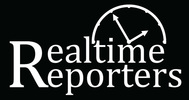
by Buell Realtime
February 04, 2020
Increasingly throughout the United States, certain corporate organizations are attempting to weaken the standards of the deposition process and bypass the three top ethical standards of the court reporting profession—Confidentiality, Impartiality, and Accuracy. The legal profession cannot simply stand by and watch this happen.
Like a giant Pac-Man, corporations offering litigation support and court reporting services have gobbled up local reporting agencies nationwide to increase market share and eliminate competition. These corporate roll-up organizations are using digital reporting technology to quickly scale their growth and justify a return on investor capital. Their primary concern is NOT improving the accuracy of transcription content nor quality of service.
This 3-part series is meant to inform you of this industry trend and identify certain business practices that may put your clients’ sensitive information at risk and lead to inadmissibility of transcripts in court.
What is “digital reporting”?
Some court reporting agencies have been sending an unlicensed, uncertified, and minimally trained individual using digital audio recording equipment to their contract clients’ depositions in place of a highly trained, licensed, Certified Court Reporter (“CCR”). These agencies are referring to the non-CCR as “Digital Reporter” (“digital” or “DR”) and sometimes as “Court Reporter.”
How does this work?
In lieu of a CCR showing up to capture the record at attorneys’ noticed depositions, counsel and their staff are discovering a DR. In some instances, attorneys are informed in advance that a CCR is not available due to a nationwide shortage of court reporters. More often, however, clients learn a non-court reporter is present just prior to the deposition, and all parties are requested to stipulate to the use of a DR.
Using a laptop and microphone, the DR turns on audio recording equipment. Later, s/he transmits the audio files to the reporting agency, which forwards them to a transcriptionist living anywhere in the world with Internet access to produce a transcript.
It happened in Tacoma recently
Buell Realtime Reporting’s Cindy Koch, a 30-year CCR, showed up to report a deposition as another “reporter” was packing up her equipment after the morning deposition in the same case. Having held several board positions within Washington Court Reporters Association (“WCRA”) since 1999 and not recognizing her, Cindy later searched her name on the Department of Licensing (“DOL”) website.
Result? Nothing.
Washington CCRs are required to include their license number on all written materials—business cards, transcripts, letters, and email. Cindy was able to secure a copy of the deposition transcript. There was no license on the DR’s transcript. The certificate pageof the now apparent DR’s transcript stated:
“l, (name removed), do hereby certify that I reported all proceedings adduced in the foregoing matter and that the foregoing transcript pages constitutes (sic) a full, true, and accurate record of said proceedings to the best of my ability.” (emphasis added)
Having a thorough knowledge of Washington’s laws, Cindy filed a complaint with the DOL.
What is the big deal and why does this matter?
The qualifications of both DRs and transcriptionists are unknown. With potentially highly sensitive testimony and exhibits, it is also unknown who is responsible for ensuring that local and federal rules are being upheld, as well as HIPAA compliance, chain of custody, confidentiality, impartiality, and accuracy of transcripts.
When you use a Washington Certified Court Reporter, you can be confident that your transcript is certified and admissible in court.
How are state rules being circumvented?
Certain court reporting agencies are circumventing state rules because they are not registered nor licensed in most states to provide court reporting services. Presumably, these agencies believe they are not obligated to adhere to the same rules that licensed, Certified Court Reporters must abide by: rules of professional conduct, ethics, chain of custody, confidentiality, impartiality, and accuracy.
How can an unlicensed, non-CCR “certify” that s/he “reported” a deposition?
The short answer: It’s not legal.
Part I - conclusion
When you use a Washington Certified Court Reporter, you can be confident that your transcript is certified and admissible in court.
Next up, Part 2 of 3: “Digital Reporting” - The Rules Are Clear.
CCRs include a signed certificate page at the end of every transcript that certifies they captured the record stenographically and transcribed their stenographic notes to the best of their ability.
Washington State Legislature’s Chapter 18.145 RCW, Court Reporting Practice Act Sections: https://app.leg.wa.gov/RCW/default.aspx?cite=18.145
